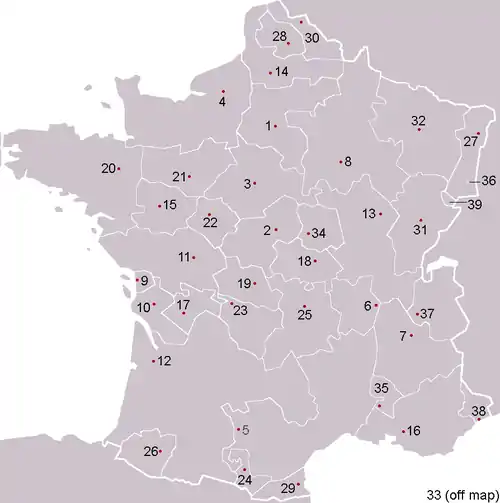Orléanais
Orléanais (French pronunciation: [ɔʁleanɛ]) is a former province of France, around the cities of Orléans, Chartres, and Blois.
Orléanais | |
|---|---|
 Flag  Coat of arms | |
| Etymology: Territory of Orléans | |
.svg.png.webp) The Province of Orléanais in 1789. | |
| Established | 960 |
| Dissolved | 1790 |
| Seat | Orléans |
| Government | |
| • Type | Feudal administrative province |
| • Counts of Blois (960–1397) | Theobald I (first) Guy II (last) |
| • Duke of Orléans (1397–1790) | Louis I (first) Louis Philippe II (last) |
| Demonym(s) | Orléanians |
The name comes from Orléans, its main city and traditional capital. The province was one of those into which France was divided before the French Revolution. It was the country around Orléans, the pagus Aurelianensis; it lay on both banks of the Loire, and for ecclesiastical purposes formed the diocese of Orléans. It was in the possession of the Capet family before the advent of Hugh Capet to the throne of France in 987, and in 1344 Philip VI gave it with the title of duke to Philip of Valois (d. 1375), one of his younger sons. In a geographical sense the region around Orléans is sometimes known as the Orléanais, but this is somewhat smaller than the former province.[1]
References
-
 One or more of the preceding sentences incorporates text from a publication now in the public domain: Chisholm, Hugh, ed. (1911). "Orléanais". Encyclopædia Britannica. 20 (11th ed.). Cambridge University Press. p. 281.
One or more of the preceding sentences incorporates text from a publication now in the public domain: Chisholm, Hugh, ed. (1911). "Orléanais". Encyclopædia Britannica. 20 (11th ed.). Cambridge University Press. p. 281.
